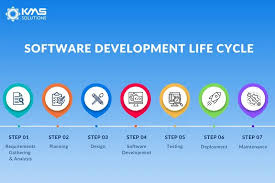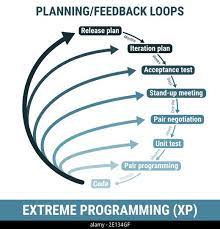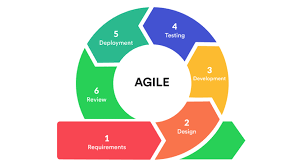Maximizing Success: The Essential Steps of an SDLC Project
The Importance of the Software Development Life Cycle (SDLC) in a Project
Software Development Life Cycle (SDLC) is a systematic process used by software developers to design, develop, and test high-quality software. It is crucial for the success of any software project as it ensures that the final product meets the requirements and expectations of stakeholders.
Phases of SDLC
SDLC consists of several phases that guide developers through the entire software development process:
- Planning: In this phase, project requirements are gathered, and a project plan is created.
- Analysis: Developers analyze the requirements gathered in the planning phase and create a detailed system design.
- Design: The system design is transformed into a detailed technical design in this phase.
- Implementation: The actual coding and development of the software take place in this phase.
- Testing: The developed software is rigorously tested to ensure it functions correctly and meets all requirements.
- Deployment: The software is deployed to production after successful testing.
- Maintenance: Post-deployment, maintenance and support activities are carried out to ensure the software remains operational and up-to-date.
Benefits of SDLC
The use of SDLC in a project offers several benefits, including:
- Better Quality: SDLC ensures that thorough testing is conducted at each stage, resulting in higher-quality software.
- Risk Management: By following a structured process like SDLC, risks can be identified early and mitigated effectively.
- Cost-Effectiveness: Proper planning and design stages help prevent costly rework later in the project lifecycle.
- Clear Communication: SDLC provides clear milestones and deliverables, facilitating effective communication among team members and stakeholders.
In Conclusion
The Software Development Life Cycle (SDLC) plays a vital role in ensuring the success of software projects by providing a structured approach to development. By following the phases of SDLC diligently, developers can create high-quality software that meets user requirements while managing risks effectively throughout the project lifecycle.
Understanding the Software Development Life Cycle (SDLC): Key Questions and Answers
- What is a project in SDLC?
- What are the 5 steps of the SDLC?
- What are the 5 stages of SDLC?
- How do you write a SDLC for a project?
- What is SDLC real life examples?
- What does the SDLC stand for?
What is a project in SDLC?
In the context of Software Development Life Cycle (SDLC), a project refers to a specific initiative or endeavor aimed at developing or enhancing software systems or applications. A project in SDLC typically involves a series of structured phases, from planning and analysis to implementation, testing, deployment, and maintenance. Each project within SDLC is unique and requires careful management of resources, timelines, and deliverables to ensure successful completion. Projects in SDLC are guided by defined objectives, requirements, and constraints that drive the development process towards delivering a high-quality software product that meets stakeholder expectations.
What are the 5 steps of the SDLC?
The Software Development Life Cycle (SDLC) consists of five key steps that guide the development process from planning to deployment and maintenance. These steps include planning, analysis, design, implementation, and testing. In the planning phase, project requirements are gathered and a project plan is created. The analysis phase involves analyzing these requirements to create a detailed system design. Subsequently, in the design phase, the system design is transformed into a detailed technical design. The implementation phase involves the actual coding and development of the software, followed by rigorous testing in the testing phase to ensure functionality and compliance with requirements. These five steps form a structured approach to software development that ensures quality and efficiency throughout the project lifecycle.
What are the 5 stages of SDLC?
The Software Development Life Cycle (SDLC) consists of five key stages that guide the development process of software projects. These stages are Planning, Analysis, Design, Implementation, and Testing. In the Planning stage, project requirements are gathered and a project plan is created. The Analysis stage involves analyzing the gathered requirements to create a detailed system design. The Design stage transforms the system design into a technical design. Implementation is where the actual coding and development of the software take place. Finally, in the Testing stage, the developed software undergoes rigorous testing to ensure it functions correctly and meets all specified requirements. These five stages of SDLC are essential for ensuring a systematic and successful software development process.
How do you write a SDLC for a project?
When writing a Software Development Life Cycle (SDLC) for a project, it is essential to follow a structured approach that encompasses the various phases of software development. Begin by conducting thorough planning to gather project requirements and create a detailed project plan. Proceed to the analysis phase where requirements are analyzed, followed by designing the system based on the analysis. The implementation phase involves coding and developing the software, which is then rigorously tested in the testing phase. Deployment to production and post-deployment maintenance complete the SDLC process. By following these steps diligently and involving stakeholders at each stage, a comprehensive SDLC for a project can be effectively written to ensure successful software development.
What is SDLC real life examples?
In real-life scenarios, Software Development Life Cycle (SDLC) methodologies are commonly applied in various industries to ensure the successful development and deployment of software projects. For example, in the healthcare sector, SDLC is utilized to create electronic medical record systems that securely store patient information and facilitate efficient healthcare delivery. Similarly, in the banking industry, SDLC is employed to develop online banking platforms that allow customers to access their accounts securely and perform transactions seamlessly. These real-life examples demonstrate how SDLC principles are essential for delivering reliable and user-friendly software solutions across different sectors.
What does the SDLC stand for?
The acronym SDLC stands for Software Development Life Cycle. It refers to a structured process used by software developers to design, develop, and test software applications. The SDLC encompasses various phases, including planning, analysis, design, implementation, testing, deployment, and maintenance. By following the SDLC methodology, developers can ensure that software projects are completed efficiently and effectively while meeting the requirements of stakeholders.











